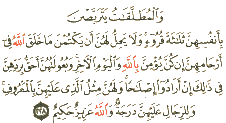|
228. " and the divorced women should wait (not wedding anyone else)
concerning themselves for three (monthly) courses;
and it is not lawful for them to conceal what allah has created in
their wombs, if they believe in allah and (in) the last day.
and their husbands have a greater right (than others) to take them back in
the meanwhile, if they wish for reconciliation (indeed).
and they (women) have rights similar to those against them in a fair
manner, but men have precedence above them;
and allah is the mighty, the wise."
commentary:
in the previous verse the words were about divorce, and then, in
this verse, a part of the ordinances of divorce and some of its concerning
details are stated. there are five ordinances mentioned in it. at first, it
speaks about ` waiting period ', saying:
" and the divorced women should wait (not wedding anyone else)
concerning themselves for three (monthly) courses; ..."
the qur'anic term /quru'/, mentioned in the above verse, is
applied in the sense of the period of cleanliness of a woman. and, since
the accomplishment of divorce should be performed at the time that the
woman is clean and has not had sexual intercourse with her husband,
this cleanliness is counted once, and when, afterward, she passes two
menstruations and becomes clean, one after another, as soon as the
third cleanliness finishes and at the moment that mestruation is seen,
the waiting period has passed and, at that very status, her marriage is
permissible.
the second ordinance is:
"...and it is not lawful for them to conceal what allah has created in their
wombs, if they believe in allah and in the last day. ..."
it is noteworthy that the problem of the beginning and ending of
the waiting period, that usually a woman understands herself rather than
anyone else, has been trusted to the statement of the woman and it is
accepted as a document.
the third ordinance understood from the verse is that the
husband can revoke during the waiting period of a revocable divorce. it
says:
"...and their husbands have a greater right (than others) to take them back
in the meanwhile, if they wish for reconciliation (indeed). ..."
in fact, when the woman is passing the
waiting period of the
revocable divorce, the husband can begin the conjugal relation again
without any ceremonies. this meaning may happen with any word or
action which is with the intention of revocation.
then the verse pays to the fourth ordinance, stating:
"...and they (women) have rights similar to those
against them in a fair manner,
but men have precedence above them;..."
thus, as there are some rights for men upon the wives, there are
also some rights for women upon husbands who are charged to observe
them.
regarding to the clear difference between the physical and
spiritual powers of woman and man, the administration of the family is
up to man and its assistance has been given to the woman. this
difference cannot be an obstacle that some women, from the point of
spiritual offices, knowledge, and piety be in a higher degree than many
of men.
the arabic term /ma`ruf/ which means a benevolent, logical and
reasonable action, has been repeated 12 times in these verses to be
counted as a warning against men and women in order that they do not
abuse their rights, but, by respecting the mutual rights of each other,
they should try to fix their conjugal relations and obtain the pleasure of
allah.
finally, at the conclusion of the verse, it says:
"...and allah is the mighty, the wise."
this concluding phrase of the verse points to the fact that the
wisdom and prudence of allah requires that in the society every
person undertakes the very duties that the law of creation has assigned
for the one and they are adapted to the structure of his body and spirit.
the wisdom of allah also requires that similar to the duties that have
been given over to women, there would be settled some certain rights
for them, too, in order that there appears an equality and justice
between duty and right.
the significance of this meaning, and the difference between the
sexes and their responsibilities, will be explained later when the occasion
applies.
|
